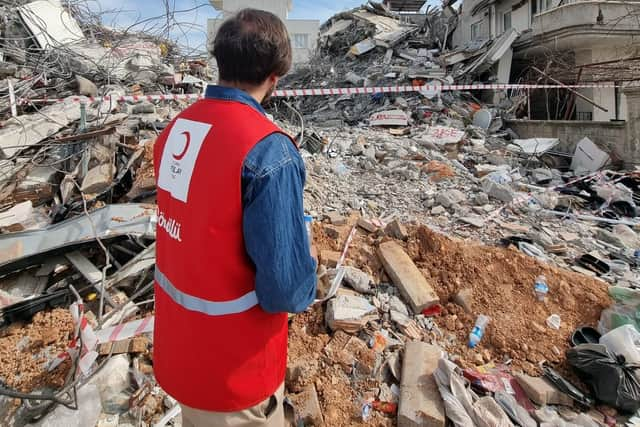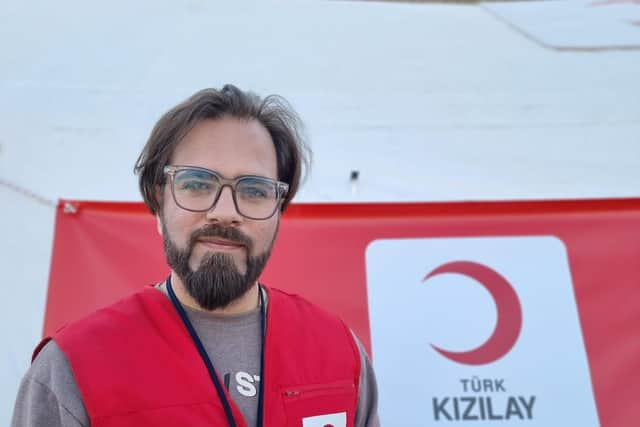‘I met a man who lost 229 family members’ says trauma counsellor working with victims of the Turkey earthquake
A trauma counsellor working with the Red Crescent in southern Turkey, which was devastated by an earthquake last month, he is meeting people on a daily basis who have lost family members and have been evacuated indefinitely from their homes.
The quake, which measured 7.8 on the Richter scale, killed around 50,000 people in southern Turkey and northeastern Syria, while destroying thousands more properties.
In some areas, entire communities have been wiped out.


Advertisement
Hide AdAdvertisement
Hide AdMr Sikander’s team of 50 therapists work on rotation to provide support to victims of the disaster.
"After working every day from morning until 8pm, before going to sleep every single day, we have a peer supervision, he says. “We ask each other ‘how are you feeling’ on a scale of one to ten, because we want to quantify it. Because we hear sad stories of people's loss.”
He tells the story of a six year old girl who had lost her entire family, except her mother’s aunt, who was now looking after her. During a role play game set up by workers in the camp, Mr Sikander saw her smile for the first time since the earthquake.
“I see this prevailing sadness which is there in the people,” he says. “So that day I was feeling really bad. [We ask] ‘Do you need anything? Do you want to talk? Is there anything else we can do for you?’


"Day in day out of listening to those stories and soaking it in like a sponge, you need this supervision.”
The International Federation of Red Cross and Red Crescent Societies (IFRC) earlier this month warned of a “second disaster” of a mental health epidemic in Turkey, saying those affected by the earthquake are at risk of developing medium and long-term mental health challenges that can hinder recovery and resilience.
Mr Sikander’s patients range from people who have lost their entire families, to those whose homes and livelihoods have been destroyed, leaving them feeling like they have little hope for the future.
One man he met walking his dog in the temporary camps set up to house the thousands of people whose homes were destroyed had lost 229 family members - yet his greatest concern was for his pet.
Advertisement
Hide AdAdvertisement
Hide Ad"That's a huge number,” he says. “It was so shocking. He told me the dog had also lost his partner and he said he feels like it’s a different animal, because if someone goes close, the dog starts attacking. He said the shock was so heavy for the dog and the dog feels depressed. Imagine the effect on the human, who has lost 229 people in his family.”
Many of the patients he treats are suffering from survivor’s guilt, after losing loved ones.
“A lot of them show signs of trauma, not only because of the loss, but there is also this idea of what we call a survivor's guilt. ‘Why did I survive? Why not my wife? Why not my children?’,” he says.
“When you see people going through the same things that you are, it leads to a feeling that you are not alone – I don’t need to do this alone and suffer – and these are the things we are moving into now.”
In Adiyaman, where the Red Crescent is working in camps for displaced people, Mr Sikander says up to 15 per cent of the population of the city was killed and 17,000 buildings were destroyed. Reconstruction is estimated to take more than a year.
"Yes, buildings can be [brought] back, but will the memories of those people be back?” says Mr Sikander. “Because the city they lived in, grew up with and had memories of childhood in will never be the same.
“This is a transition period, right now they are living in tents, they will move to containers and then a house, that will take a year. But the whole city is changed, the buildings will be put on the higher ground. It is a completely different city that people will be living in. People go through these different types of traumas. So I think psychologically, it's going to take a toll on people and we will see the long term psychological effects.”
In the first month, the team focused on providing mental health first aid, while victims’ immediate needs were met such as food, water and shelter. Mr Sikander says the initial aim was to get people to start a routine in their lives – sending children to school in the camps, or joining a basketball group for young people.
Advertisement
Hide AdAdvertisement
Hide AdNow, they are beginning to focus on longer term therapy – expecting many people to suffer from “prolonged grief disorder”, where survivors experience intense grief for more than six months and Post Traumatic Stress Disorder, which often does not manifest itself immediately after a period of stress.
"Now after the needs are met, everybody has food and shelter and water, what next? What we thought as a clinic was about the fact that just providing psychological first aid in the first month is not going to be enough,” Mr Sikander said. “So, now, we are going to be there for a year. I'm especially concerned about children, obviously, but also one of the factors that I saw recently is the needs of the young men.”
He said while women and children often throw themselves into activities provided at the camp, younger men are less likely to engage. His team has set up groups where men can speak to each other about their experiences.
"They find it difficult to speak to a therapist and there are not many places where they can channelise this loss or where they can talk about whatever they have lost," he says. “We try to do that.”
Many of those involved in the search and rescue operation - a lot of them local first responders - also require psychological support.
“You have teams who are in the search and rescue teams who couldn't eat food for days because they would rescue bodies – many of them dead bodies - and because they are under buildings, sometimes it is just parts and they have to put them in the body bags,” he says.
“They feel numb. Everybody talked about this smell. The smell of the streets is something you never forget and they were seeing it day in and day out.
“It was really sad that despite what they were going through on the inside, they were supposed to just do their job and not speak about what they were feeling.”
Donations to the Disasters Emergency Committee Turkey Syria Earthquake Appeal can be made at dec.org.uk.
Comments
Want to join the conversation? Please or to comment on this article.
